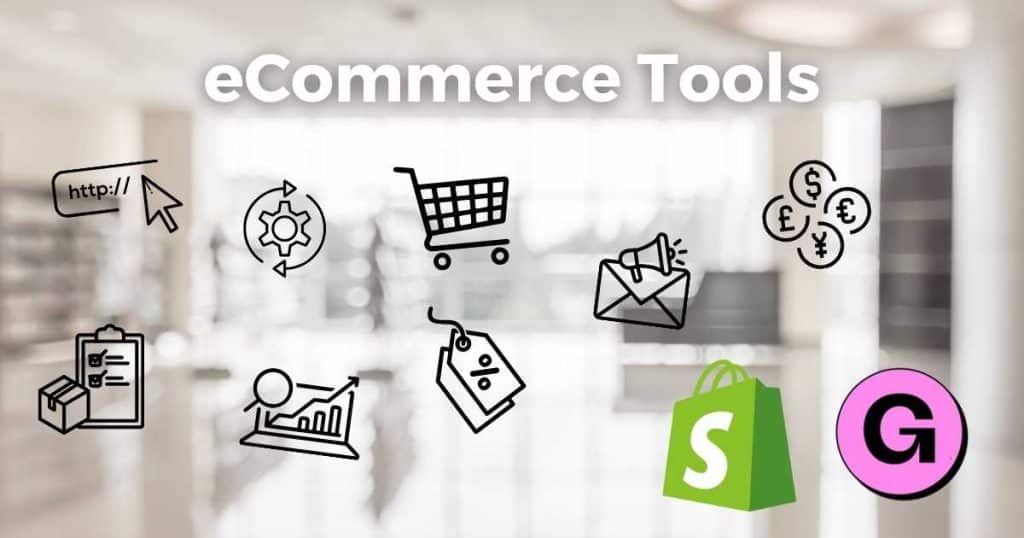In this article, I explore two online eCommerce platforms – Gumroad vs Shopify to help you decide which to use to sell your products online.
You’ve likely heard of Shopify, a comprehensive online store website builder used by millions worldwide.
But you’re here because you’re considering using the eCommerce underdog Gumroad instead of Shopify, right?
Well, can Gumroad compete with the absolute powerhouse that is Shopify? Or does Shopify still remain the top choice for your small business?
Let’s find out.
Quick Summary
- If you sell digital products and value simplicity, Gumroad may be a better fit. But Shopify is the better choice if you sell physical and digital products.
- Shopify is much more scalable than Gumroad, with advanced inventory and order management tools, built-in marketing and POS features, and more.
- Gumroad doesn’t charge a monthly subscription fee. Instead, they take a 10% flat rate on all transactions. Shopify offers a tiered monthly subscription pricing structure, starting from $29 per month.
- Check out my step-by-step video guide on how to use Gumroad and Shopify here.
Gumroad vs Shopify 2024

In this head-to-head battle, we’ll explore the unique features, benefits, and differences between these two dynamic eCommerce giants – Gumroad vs Shopify.
Whether you’re a creative artist, a budding entrepreneur, or an established business owner, join me as we discover the best eCommerce solution for you!
Are you ready to dive into the world of eCommerce and find the perfect platform for your business?
Read more: How To Sell Your Products Online?
What Are They? Gumroad vs Shopify
Gumroad is an online eCommerce platform and marketplace that revolutionizes the selling experience for creators and artists.
With Gumroad, you can sell your digital products and services directly without the need for a middleman.
This means that creators can focus solely on what they’re good at – creating, of course!
Whether you create music, courses, ebooks, images, films, or any other digital product, Gumroad can help you sell these products with minimal effort.
Check out my Gumroad storefront here!
On the other hand, Shopify is an all-in-one website builder and eCommerce platform that empowers businesses to create and manage their own online stores.
With its intuitive interface and user-friendly design, Shopify offers a seamless journey for entrepreneurs to launch their online ventures.
From creating custom logos and designs to accepting payments and real-time order tracking, Shopify’s impressive suite of features suits businesses of all sizes!
So, with that said, what are the key differences between Gumroad and Shopify?
Read more: Do You Need an LLC For Shopify?
What Are The Differences Between Gumroad vs Shopify?

Although Gumroad and Shopify both cater to eCommerce businesses, they’re actually quite different platforms!
Firstly, Gumroad is more of an online marketplace (similar to Etsy) that focuses primarily on helping creators and artists sell digital products directly to their customers.
Shopify is a premium eCommerce website builder that lets users build and manage a fully-fledged online store to sell their physical and digital products.
In terms of versatility, Shopify is more flexible and scalable, with a range of built-in advanced features to support this.
Gumroad, however, excels in simplicity, allowing creators the opportunity to seamlessly self-publish and sell their products easily.
Read more: Shopify vs Etsy.
Ease Of Use
If you’re seeking a user-friendly eCommerce platform, you can’t go wrong with Shopify or Gumroad.
Both platforms offer intuitive dashboards that are easy to navigate, even for beginners!
Although feature-rich, Shopify is known for being beginner-friendly, with an easy setup process and user-friendly tools.
The user interface, customizable templates, and drag-and-drop editor allow for easy customization.
Additionally, all the tools and features you could ever need for your online store can be found within Shopify, which is perfect for streamlining your business operations.
In comparison, Gumroad excels at creating compelling pages and shopping experiences for small business creatives or artists selling digital downloads, courses, and more.
Simply build your storefront within minutes using their attractive templates or use the Gumroad plugin to quickly add sales features to your existing website (more on this soon!)
Overall, Gumroad’s flexible page editor and seamless import of contact and customer information make it easy for anyone to use.
So, as you can see, both are pretty user-friendly. However, Gumroad is slightly more straightforward due to having fewer features than Shopify.
Winner = Gumroad.
Read more: Magento vs Shopify.
Pricing
Shopify:
- Basic: $29 per month.
- Shopify: $65 per month.
- Advanced: $399 per month.
Shopify also charges a transaction fee per sale (unless you use their built-in payment system).
Gumroad:
Gumroad doesn’t charge a monthly subscription fee. Instead, they take a 10% flat fee from every sale, meaning they only earn when you do.
This is appealing to small businesses but also means that a portion of your profits is shared with Gumroad each month.
As your company scales and grows, you might find it challenging to maintain high-profit margins with Gumroad!
Winner = Gumroad (for businesses that only make minimal sales) Shopify (for growing businesses).
Read more: Ecwid vs Shopify.
Customization
Both Gumroad and Shopify offer options to personalize your online store, but which platform has the cutting edge?
As I mentioned, Gumroad prioritizes simplicity and, therefore, only provides basic customization options.
While it doesn’t offer the same level of design freedom as Shopify, you can still choose a color scheme and add a custom domain.
Additionally, you can select between a few pre-designed themes that you can customize, but the selection is far more limited than Shopify’s.
Shopify offers over 170 mobile-responsive, fully customizable themes that range in price from $0-180.
Also, users with coding knowledge can take advantage of custom fields and CSS to make your website truly unique!
In addition to themes, Shopify’s customization options for products are extensive.
You can add custom fields to product pages, like size or color options, and even create custom product templates for different types of products.
Shopify offers more flexibility and freedom compared to Gumroad. Therefore, it’s the winner here!
Winner = Shopify.
Read more: How To Remove Powered By Shopify On Your Website?
Gumroad vs Shopify Tools

Shopify offers a set of comprehensive features and tools that include:
- A fully functional website builder that can help you create an impressive storefront.
- Third-party payment processing apps like PayPal and Stripe and an in-house Shopify Payments feature.
- Built-in email marketing, SEO-friendly pages, blogging capabilities, and social media integrations.
- Abandoned cart recovery and the ability to offer discounts.
- In-depth business management tools to help you manage tax, orders, customers, and inventory.
- Automation tools through Shopify Flow to help streamline aspects of your business.
- In-depth insights and reporting on your business data.
- Multi-channel and multi-currency capabilities.
- A comprehensive app marketplace to increase the functionality of your store.
Gumroad’s list of features and tools is certainly more limited, but they put up a good fight!
Some features include:
- A page editor that lets you customize your storefront.
- The ability to embed your store onto your existing website.
- A built-in ‘basic’ email marketing tool.
- Membership and subscription options for customers.
- A dynamic ‘pay what you think it’s worth’ monetization strategy.
- Multi-currency capabilities with multiple payment tools.
- Discounts.
- Basic analytics, automated workflows, and social integrations.
Winner = Shopify.
Read more: Google Analytics Integration For Shopify.
Gumroad vs Shopify Standout Features
Gumroad

While Gumroad’s capabilities are less broad than Shopify’s, there are some awesome features that Shopify doesn’t offer.
For starters, you can embed your Gumroad storefront onto any existing website.
This is perfect for people looking to sell just a few products but don’t want to invest the time or money into building a fully-fledged website.
Gumroad also offers flexible subscription and membership options for customers, where payments can be collected monthly, quarterly, biannually, or yearly.
Additionally, Gumroad’s piracy prevention measures safeguard your valuable digital products from being pirated online!
Gumroad doesn’t restrict any specific file types, making it possible for you to offer files in PDF, ePub, or Mobi formats, which allows your customers to choose their preferred file type.
And finally, Gumroad enables the creation of custom license keys, which is particularly handy for those who sell software!
Read more: Is It Better To Use Shopify or Wix?
Shopify

Shopify stands out with its feature-rich built-in systems, including Shopify Email, Shopify Point of Sale (POS), Shopify Fulfillment Network, Shopify Payments, and more.
These built-in features are easy-to-use and insightful tools that can help you manage every aspect of your online store.
And the best part is you don’t have to leave Shopify!
Another standout feature is the ability to add unlimited products to your store, regardless of your chosen plan!
This flexibility appeals to small businesses, particularly those keen on testing trending or multiple products.
Shopify also provides unlimited storage, bandwidth, and hosting, ensuring reliable uptime and removing any restrictions that could hinder your business down the line.
Additionally, the Fraud Analysis Tool helps small businesses assess the legitimacy of orders and make informed decisions on fulfillment.
And finally, Shopify’s impressive App Marketplace offers thousands of integrations with all your favorite online tools to enhance your online store!
Gumroad vs Shopify Customer Support
While Gumroad and Shopify are easy to use, there will be times when you need a helping hand.
Gumroad primarily offers customer support through its ‘Help Center,’ which contains various articles covering various topics.
And for additional assistance, Gumroad has a live chat feature, with a response time of 24 hours.
Unfortunately, phone support isn’t available, but you can still engage with Gumroad through social media channels or email.
On the other hand, Shopify provides a range of convenient options to connect with experts directly from your store’s backend.
Whether through email, live chat, or phone (in select regions), you can contact seasoned Shopify experts to help you with whatever you’re having trouble with.
Shopify also has an extensive range of guides, videos, and blog posts and offers a comprehensive FAQ section specifically designed for beginners.
Winner = Shopify.
Read more: Weebly vs Shopify.
Gumroad vs Shopify Who Are They Best For?

Ultimately, the choice between Shopify and Gumroad is up to you. But listen up if you want my two cents!
Shopify stands out as the top choice if you sell digital and physical products and seek scalability and flexibility.
Additionally, Shopify’s wide array of built-in tools and third-party integrations can help you streamline your eCommerce store processes.
Managing customers, orders, and payments is an absolute breeze, and the level of insight you get through using these tools can help your business grow to the next level!
But what truly sets Shopify apart is its ability to bridge the gap between online and offline sales.
Shopify offers convenient point-of-sale technology, enabling you to expand your sales into physical retail spaces seamlessly!
On the other hand, if you’re a creator and just want to quickly sell and get your digital products out in the world (with minimal effort), Gumroad is likely better suited for you.
With an intuitive and convenient page editor, you can create an attractive sales page in minutes without technical knowledge.
They also offer the flexibility to embed your sales features into any existing website you may already have, which is a pretty cool feature!
And finally, Gumroad operates on a model without monthly fees, giving creators more control over their revenue.
Stews Final Thoughts
And there you go!
As you can see, Gumroad and Shopify have individual strengths and weaknesses and are actually suited toward completely different business types.
I suggest taking a step back and considering your budget, business type, and business goals before launching into either platform.
So, what will you be using to sell your products? Gumroad vs Shopify?

